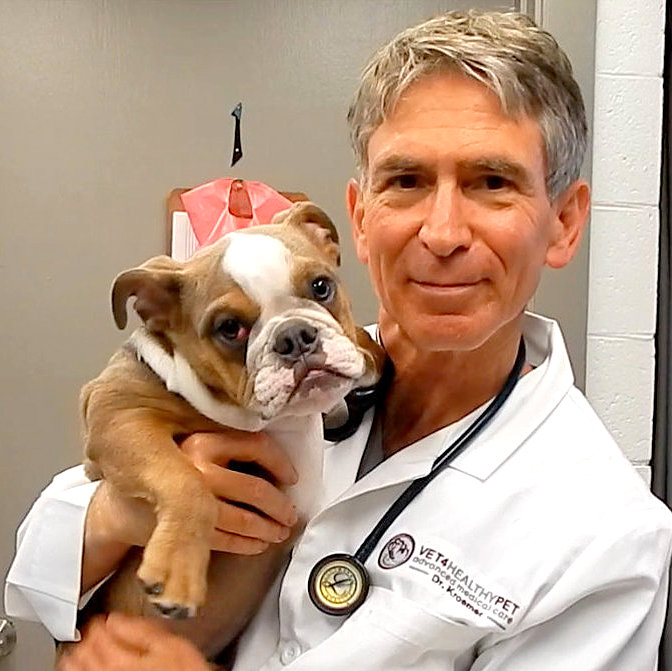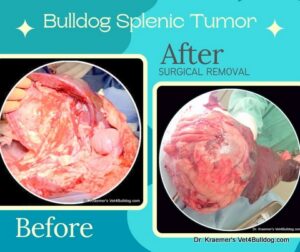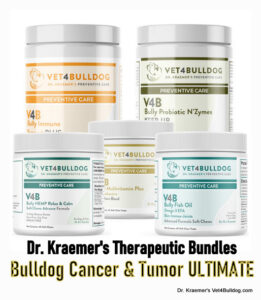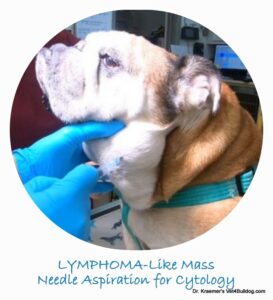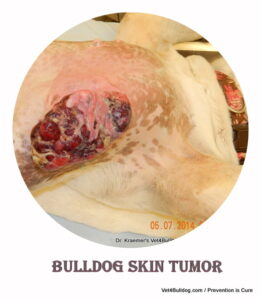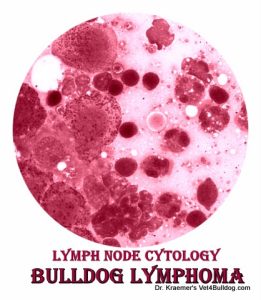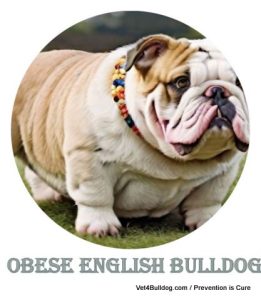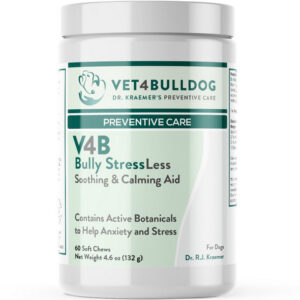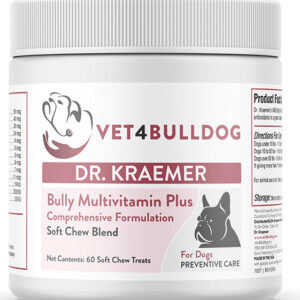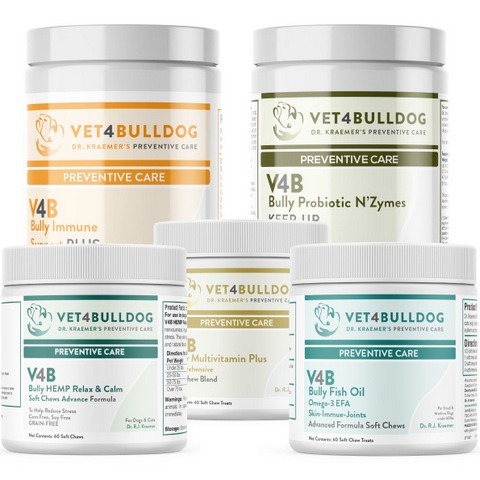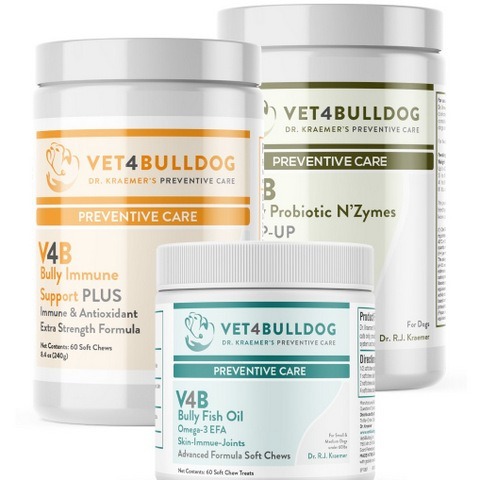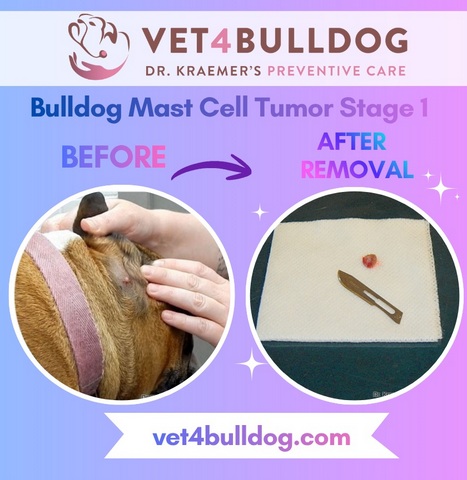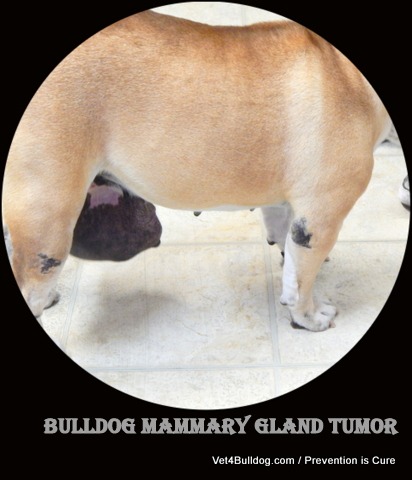Introduction To Bulldog and French Bulldog Lymphoma
Lymphoma, in bulldogs and French bulldogs, is also referred to as lymphosarcoma.
It is a cancer of the lymphatics and a white blood cell called a lymphocyte that is vital for your bully immune system and can be diagnosed in any body part that has lymphatics and lymphocytes.
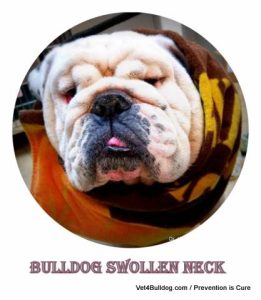
Lymphoma, like most types of cancer, is more common in older bulldogs.
Cancerous lymphocytes are classified as B-cell or T-cells
Bulldog Lymphoma Cancer (Pyoderma) 5 X MUST KNOW
- Lymphoma is a cancer of a white blood cell “lymphocyte” and the lymphatic system
- The most common lymphoma is one of the lymph nodes, others are GI, skin, chest, and bone marrow
- With treatment, bulldog lymphoma can go into remission but it is not a curable cancer
- Chemotherapy is the most common treatment and can be combined with bully therapeutic supplements
- Prevention and care include low stress, genetic selection, and bully therapeutic supplements
Welcome to Our “Prevention Over RX” Bulldog Community
Lymphoma in Bulldogs and French Bulldogs / COMMON SITES:
- LYMPH NODE (multicentric): is the most common site, representing nearly 80-90% of all lymphoma cases
- GI (alimentary): gastrointestinal
- CHEST (Mediastinum): which is the front part of the chest (thymus)
- SKIN (cutaneous): aggressive-looking ulcerative raised lesions
- BONE MARROW (Leukemia)
What Causes Lymphoma in Bulldogs and French Bulldogs?
The exact cause of lymphoma in dogs, as with many types of cancer, remains largely unknown.
Research indicates that it is likely multifactorial, involving a combination of genetic, environmental, and possibly viral factors, among others.
- Genetic
- Viral
- Carcinogen exposure
- Chronic Stress
- Obesity & Diet
- Toxic Substance
Understanding the exact causes of lymphoma in bulldogs is an area of active research.
Identifying specific risk factors could lead to better prevention strategies and targeted treatments
What Are The Symptoms of Bulldog Lymphoma?
The clinical signs of lymphoma can vary widely and are influenced by factors such as:
- Location: the location of the cancer
- Type: the specific type of lymphoma
- Timing: how advanced the disease was at the time of diagnosis
The wide range of symptoms seen in lymphoma stems from the many functions of the lymphatic system and lymphocytes throughout the body, along with the disease’s capacity to involve multiple organs and tissues.
Below is a closer examination of how these factors shape the clinical presentation of lymphoma
1. LYMPH NODE LYMPHOMA (Multicentric)
Characterized primarily by the enlargement of multiple peripheral lymph nodes.
This form of cancer can be relatively straightforward for bully owners to detect due to the visible or palpable swelling.
The most commonly observed enlarged lymph nodes are:
- Mandibular Lymph Nodes: Located in the neck under the jaw
- Axillary Lymph Nodes: Found in the armpits, swelling in this area might be less obvious unless it becomes significantly enlarged or the dog shows discomfort when lifting its legs.
- Inguinal Lymph Nodes: Located in the groin area, enlargement here can sometimes be spotted when a dog lays on its back or side, or during grooming.
- Popliteal Lymph Nodes: Situated behind the knee cap, these are also among the easier sets of lymph nodes for pet owners to detect through touch when the dog is in a relaxed position.
The enlargement of these lymph nodes is typically symmetrical and can progress from being barely noticeable to quite pronounced as the disease advances.
Caution: It’s important to note that while enlarged lymph nodes are a key feature of multicentric lymphoma, they can also be indicative of other conditions, such as infections or other immune responses
The lymphoma enlarged lymph nodes are not painful
2. GI BULLDOG LYMPHOMA:
Bulldog with lymphoma affecting the gastrointestinal tract may show symptoms related to the digestive system, such as
- vomiting
- diarrhea
- weight loss
- loss of appetite
3. CHEST MEDIASTINAL LYMPHOMA:
When lymphoma affects the mediastinum — the area in the chest that houses the heart, trachea, and lymph nodes — its mass effect on the lungs or trachea can cause respiratory signs in your bulldog. These may include
- difficulty breathing
- coughing
- and increased breathing effort
4. SKIN CUTANOUS LYMPHOMA:
Lymphoma that affects the skin can lead to various skin changes, including
- redness
- ulcers
- raised
- itchy
- painful
- infected
OTHER COMMON LYMPHOMA SYMPTOMS:
- Lethargy
- Fever
- Inappetence
- Weight loss
- Increased thirst/urination
- Swollen legs
- Trouble breathing/elevated respiratory rate
Lymphoma Tumors in Bulldogs and French Bulldogs / DIAGNOSIS:
Diagnostic tests are needed to recognize lymphosarcoma and exclude other diseases.
- BLOOD COUNT (CBC): abnormal count and abnormal cells
- BLOOD CHEMISTRY: some lymphoma cases will have high blood calcium level
- RADIOGRAPHS: chest X-rays can help rule out metastatic disease to the lungs and large chest mass
- FNA (fine needle aspirate): aspirating cell from an enlarged lymph node for cytological exam
- BIOPSY: for histopathology
- ULTRASOUND: to survey the abdomen for abnormalities
- BONE MARROW ASPIRATE
How To Prevent Lymphoma Tumors in Bulldogs and French Bulldogs?
While there is no guaranteed way to prevent lymphoma in dogs due to the complex interplay of genetic and environmental factors that contribute to the disease, certain strategies may help lower the risk or potentially improve the overall health and immune system of your bulldog.
PREVENTION IS CURE
Here’s a closer look at these preventative strategies:
1. BREEDING SELECTION LYMPHOMA PREVENTION
Genetic Screening: Choosing breeding animals with no history of lymphoma or related cancers in their lineage might reduce the risk for future generations.
2. LIFESTYLE CHOICES FOR LYMPHOMA PREVENTION
Exercise and Weight Management: Maintaining a dog’s healthy weight through regular exercise and a balanced diet can support overall health and potentially reduce cancer risk.
Obesity has been linked to an increased risk of various diseases, including some cancers, in both humans and animals.
3. DIET BULLDOG LYMPHOMA PREVENTION
- Balanced Nutrition: Feeding dogs a well-balanced diet suited to their age, breed, and health status can support their immune system.
- Reduced Carcinogen Exposure: Minimizing exposure to potential dietary carcinogens, such as those found in some processed foods or foods with artificial additives, could be beneficial.
4. STRESS-FREE ENVIRONMENT LYMPHOMA Stress-Free Environment
Reducing Stress: Chronic stress can impact the immune system, potentially making dogs more susceptible to diseases. Providing a stable, enriched environment with regular routines, plenty of physical and mental stimulation, and minimal exposure to stressful situations may contribute to overall health.
5. BULLY THERAPEUTIC SUPPLEMENTS FOR CANCER
- Medical Mushrooms: Certain medicinal mushrooms, such as Reishi, Turkey Tail, and Shiitake, have been studied for their immune-boosting and anti-cancer properties.
- Antioxidants, Vitamins, and Minerals: Supplements containing antioxidants (e.g., vitamins E and C), omega-3 fatty acids, and other specific vitamins and minerals may support immune health.
- Probiotics: Probiotics can support gut health, which is closely linked to overall immune function. A healthy gut microbiome may contribute to a stronger immune system, potentially influencing cancer risk.
- Essential Fatty Acids: Omega-3 fatty acids, found in fish oil and certain plant oils, have anti-inflammatory properties and may support immune health.
- V4B Bully Fish Oil
- Anti-anxiety and StressLess supplements can help calm anxious pets
- V4B Bully StressLess Formula
- V4B Bully HEMP Relax & Calm
How To Treat Lymphoma Tumors in Bulldogs and French Bulldogs?
Chemotherapy is the most common treatment employed in treating lymphoma in bulldogs, though alternative modalities like radiation and surgery may also be applicable in certain scenarios.
While chemotherapy can initially seem daunting, it’s commonly associated with concerns about potential side effects among pet owners. To assist you in making the best decision for both you and your pet, we’ve outlined a brief list of crucial considerations:
- Quality of Life: Your primary aim should be to extend your pet’s life while minimizing any associated discomfort.
- Side Effects: Unlike in humans, instances of hair loss or facial swelling are rare in dogs undergoing chemotherapy. Generally, pets tolerate treatment well with minimal side effects.
- Age and Physical Condition: Both the age and overall health of your pet should factor into your decision-making process.
- Cost: Financial considerations can play a significant role in determining the best course of action.
- Time Commitment: Certain aspects of the chemotherapy protocol may necessitate hospital visits and extended stays, so be prepared to commit time to your pet’s treatment.
- Lifestyle Preferences: Some owners may have a preference for alternative treatments.
By carefully weighing these factors alongside your veterinarian’s guidance, you can determine the most appropriate treatment plan for your pet’s specific needs and circumstances.
#1 Chemotherapy (gold standard) Treatment for Bulldog Lymphoma
- Multi-agent protocols (e.g., CHOP: cyclophosphamide, doxorubicin, vincristine, prednisone)
- Single-agent protocols (e.g., doxorubicin alone) for simpler regimens or when cost is a concern
Often well tolerated in dogs, with fewer severe side effects than in humans
#2 Treating Lymphoma With Prednisone or other corticosteroids alone
- Can temporarily shrink lymph nodes and improve comfort
- Not curative; median survival ~1–3 months
- May make later chemotherapy less effective
#3 Lymphoma Cancer Treatment With Radiation Therapy
Mostly for localized lymphoma (rare) or as palliative care for specific problem areas
#4 Palliative Care For Bulldog and Fr. Bulldog Lymphosarcoma Cancer
Focus on quality of life — controlling discomfort, appetite, and inflammation
BULLDOG LYMPHOMA CHOP PROTOCOL TREATMENT
CHOP is an acronym for a chemotherapy protocol commonly used in the treatment of lymphoma in dogs. It consists of four drugs:
- cyclophosphamide
- doxorubicin
- vincristine
- prednisolone/prednisone.
CHOP protocols involve drugs with specific handling requirements and are typically administered by veterinary oncology specialists.
What The Prognosis For Bulldog and Fr. Bulldog Lymphoma Tumors?
With chemotherapy, many dogs with lymphoma can achieve remission, meaning all signs of the disease temporarily disappear.
It’s important to understand that remission is not the same as a cure.
The length of time a dog stays free of symptoms, known as the disease-free interval, depends on factors such as the
- Type: type of lymphoma,
- Health: You bulldog overall health
- Prior Treatments: In general the more treatments your bulldog had the shorter the remission and the faster the relapse..
On average, a full chemotherapy protocol offers about 8–9 months of remission, with an average survival time of 12–18 months. Some dogs may relapse sooner, while others exceed these averages.
If prednisone is used alone as palliative care at home, life expectancy is typically less than 3 months.
With CHOP chemo: median survival 12–18 months, ~20–25% alive at 2 years
Steroids alone: usually weeks to a few months
No treatment: typically 1–2 months
Recommended by Owners Approved by Bulldogs



